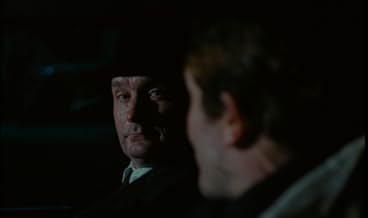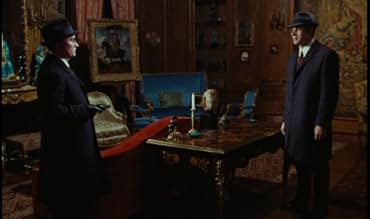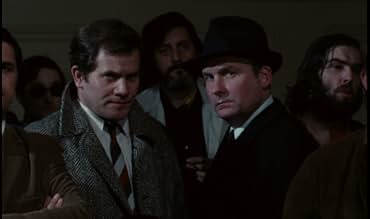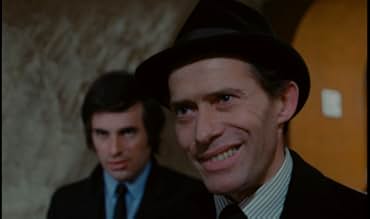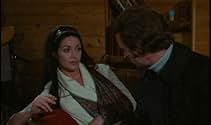While investigating a drug case, an inspector is shot dead by a gangster. His colleague, Inspector Favenin, is assigned to solve this crime. He is ready to do anything to save his colleague'... Read allWhile investigating a drug case, an inspector is shot dead by a gangster. His colleague, Inspector Favenin, is assigned to solve this crime. He is ready to do anything to save his colleague's honor, even if it means going beyond the law.While investigating a drug case, an inspector is shot dead by a gangster. His colleague, Inspector Favenin, is assigned to solve this crime. He is ready to do anything to save his colleague's honor, even if it means going beyond the law.
Gianni Garko
- Dan Rover
- (as John Garko)
Anne Carrère
- Christine
- (as Anne Carrere)
Théo Sarapo
- Lupo
- (as Theo Sarapo)
Jean-Claude Bercq
- Germain
- (as Jean-Claude Berck)
Stéphan Holmes
- Le jeune garçon
- (as Stephan Holmes)
Featured reviews
Harry Callaghan and Popeye Doyle have become iconic characters since their first appearances in the early seventies and the Rogue Cop genre has remained extremely popular.
To non-European audiences Inspector Favanin is hardly likely to be a household name. His character appeared in 1970 in this film of Yves Boisset and it is well-nigh impossible fifty years on to appreciate just what an impact the film made and the obstacles its director faced to get it released without cuts. Due to its graphic violence and its depiction of the police, Boisset was obliged to go before a censorship committee one of whose members was Jean-Pierre Melville(!) and eventally its release was approved. Suffice to say its notoriety guaranteed excellent box office.
The masterstroke here is the casting, against type, of Michel Bouquet. When his friend and colleague played by Bernard Fresson is killed in the line of duty Favenin becomes an avenging angel, using any means at his disposal to track down those responsible, thereby becoming not only judge and jury but also executioner.
As one would expect from Boisset this is a study in corruption and furthermore, by the standards of its time its content is relentlessy grim, desolate and bloody. There are no romantic, folk hero types here with their particular moral codes in the style of Melville but instead beasts in the jungle. Does Favenin regret his actions? The final shot of him sitting alone is cleverly ambiguous.
Bouquet is riveting in the role and he is ably supported by Adolfo Celi, Michel Constantine, Gianni Gekko, Henri Garcin and Francoise Fabian.
Although this film undeniably broke new ground and forever transformed the genre in France, I personally harbour no desire to view it again.
Ironically, it was knocked off its top slot by 'Le Cercle Rouge' of none other than Jean-Pierre Melville!
To non-European audiences Inspector Favanin is hardly likely to be a household name. His character appeared in 1970 in this film of Yves Boisset and it is well-nigh impossible fifty years on to appreciate just what an impact the film made and the obstacles its director faced to get it released without cuts. Due to its graphic violence and its depiction of the police, Boisset was obliged to go before a censorship committee one of whose members was Jean-Pierre Melville(!) and eventally its release was approved. Suffice to say its notoriety guaranteed excellent box office.
The masterstroke here is the casting, against type, of Michel Bouquet. When his friend and colleague played by Bernard Fresson is killed in the line of duty Favenin becomes an avenging angel, using any means at his disposal to track down those responsible, thereby becoming not only judge and jury but also executioner.
As one would expect from Boisset this is a study in corruption and furthermore, by the standards of its time its content is relentlessy grim, desolate and bloody. There are no romantic, folk hero types here with their particular moral codes in the style of Melville but instead beasts in the jungle. Does Favenin regret his actions? The final shot of him sitting alone is cleverly ambiguous.
Bouquet is riveting in the role and he is ably supported by Adolfo Celi, Michel Constantine, Gianni Gekko, Henri Garcin and Francoise Fabian.
Although this film undeniably broke new ground and forever transformed the genre in France, I personally harbour no desire to view it again.
Ironically, it was knocked off its top slot by 'Le Cercle Rouge' of none other than Jean-Pierre Melville!
The basic motif to see it remains the admirable job of Michel Bouquet. A film about friendship, duty and corruption , simple, precise and using cold tones.
A cop is killed.
His colegue looks for the murderer, using all tools for find him.
Nothing new but seductive for the cinematography and for the wise way to use American model, giving to it profound nuances.
A film about guilty, to.
Interesting for the exploration of characters.
A cop is killed.
His colegue looks for the murderer, using all tools for find him.
Nothing new but seductive for the cinematography and for the wise way to use American model, giving to it profound nuances.
A film about guilty, to.
Interesting for the exploration of characters.
Increasingly I have more respect over the real French movies, this Noir picture has a fabulous phrase said by Adolfo Celi, "Beware don't try to save the world, just defend the society as it really is" that reflects on our kind of society, when his partner and close friend L'Inspecteur Barnero (Fresson) was killed pursuing two killers, the honest L'Inspecteur Favenin (Bouquet) decides make justice by own hands, killing all them whom were involved with Barnero's death, unusual plot, Faverin an inconspicuous policeman, using all kinds of gimmicks to get his revenge, a slight cold behavior, sneaky he get in at house's assassin Villete (Constantin) there he faces the killer, a fabulous sequence, killing him like a dog, nevertheless came out the regret, even an unknown picture if look the numbers of votes at IMDB, just few 270 with seven reviews only, it has a great casting, although it's a brutal movie, violent and contemporary, a realistic picture, impressed me entirely, hope others have a change to see the hidden
gem from the director Yves Boisset who displayed several allusive red posters !!
Resume:
First watch: 2019 / How many: 1 / Source: DVD / Rating: 8.5
Resume:
First watch: 2019 / How many: 1 / Source: DVD / Rating: 8.5
Yves Boisset is not one of the famous French directors, which amplifies for me the (pleasant) surprise of watching his 1970 film 'Un condé' ('The Cop'). The director, who had been Jean-Pierre Melville's assistant, among others, demonstrates here that he not only learned many of the secrets of the trade from his master, but also that he had the courage to combine the genre of film noir (a tradition in French movies) with political cinema. The result makes of 'Un condé' both violent entertainment in the genre of the movies in which the cops are only a little less evil than the gangsters they face, and a political film in which a crisp message and characters immersed in moral corruption. In perfect synchronicity with what was happening at the same time in American cinema, 'Un condé' brings to the screen a vigilante hero with whom, as spectators, we identify for a while, until the moment the violence accumulates and we begin to question whether justice achieved through such illegal means remains justice, even in situations where there seems to be no alternative to the use of violence.
I liked the way this story is told. It starts with a settlement of accounts in the underworld between a gang of mobsters who do not hesitate to use any kind of violence to achieve their goals and the owner of a place who refuses to give up and pays with his life. When his sister and his best friend decide to take revenge, we, as spectators, cannot help but empathize with their feelings. A pair of policemen who seem incorruptible and who, because they are honest, are marginalized in a system that prefers to reach a 'modus vivendi' with criminals, comes into action. When one of them is killed by the same gang of mobsters, revenge seems justified, and again, as spectators, we are involved. The problem is that the world described in the film does not know clean methods to achieve its goals. Revenge means homicide, and police use Gestapo-like methods of interrogation. Made in 1970, 'Un condé' contains a strong post-1968 message of protest against police violence, which Yves Boisset will continue in his future films.
Made during the heyday of the 'film noir' genre in French cinema, a genre that had absorbed some of the talents of the New Wave, 'Un condé' is not inferior to many of the best-known achievements of the genre. The clear and intelligent script, the consistent visual conception and the fact that the characters are not morally judged for what they do contribute to this. They are committing atrocities for noble causes: friendship, fighting crime, opposing police corruption. If there is a culprit, this is the system that does not leave them too many alternatives. Michel Bouquet creates one of the best roles of his career and Michel Constantin adds another role to the ones that made him a favorite actor in gangster movies over several decades. I recommend the film, which in my opinion falls into the category of cinematic jewels that need to be rediscovered.
I liked the way this story is told. It starts with a settlement of accounts in the underworld between a gang of mobsters who do not hesitate to use any kind of violence to achieve their goals and the owner of a place who refuses to give up and pays with his life. When his sister and his best friend decide to take revenge, we, as spectators, cannot help but empathize with their feelings. A pair of policemen who seem incorruptible and who, because they are honest, are marginalized in a system that prefers to reach a 'modus vivendi' with criminals, comes into action. When one of them is killed by the same gang of mobsters, revenge seems justified, and again, as spectators, we are involved. The problem is that the world described in the film does not know clean methods to achieve its goals. Revenge means homicide, and police use Gestapo-like methods of interrogation. Made in 1970, 'Un condé' contains a strong post-1968 message of protest against police violence, which Yves Boisset will continue in his future films.
Made during the heyday of the 'film noir' genre in French cinema, a genre that had absorbed some of the talents of the New Wave, 'Un condé' is not inferior to many of the best-known achievements of the genre. The clear and intelligent script, the consistent visual conception and the fact that the characters are not morally judged for what they do contribute to this. They are committing atrocities for noble causes: friendship, fighting crime, opposing police corruption. If there is a culprit, this is the system that does not leave them too many alternatives. Michel Bouquet creates one of the best roles of his career and Michel Constantin adds another role to the ones that made him a favorite actor in gangster movies over several decades. I recommend the film, which in my opinion falls into the category of cinematic jewels that need to be rediscovered.
Yves Boisset directs "Un Condé" with remarkable succintness and efficiency. To that end he is greatly assisted by Michel Bouquet's deadpan, top drawer performance, who in turn is well supported by Bernard Fresson, Adolfo Celi, Gianni Garko and the beautiful Françoise Fabian.
Inspector Favenin's character is built layer by layer and Bouquet emerges very convincingly as a copper doubling up as vigilante. The script is very good, with sharp dialogue, including copper talk in French. It would appear that this film provided some inspiration for DIRTY HARRY the following year and DEATH WISH in 1974.
Very competent and economical cinematography, reminiscent of Don Siegel's straightforward punches pulled approach to action.
I strongly recommend this film to anyone interested in film noir and in the French cinema.
Inspector Favenin's character is built layer by layer and Bouquet emerges very convincingly as a copper doubling up as vigilante. The script is very good, with sharp dialogue, including copper talk in French. It would appear that this film provided some inspiration for DIRTY HARRY the following year and DEATH WISH in 1974.
Very competent and economical cinematography, reminiscent of Don Siegel's straightforward punches pulled approach to action.
I strongly recommend this film to anyone interested in film noir and in the French cinema.
Did you know
- TriviaAlthough his film is close to Pierre Lesou's novel, director Yves Boisset confessed that, during the scene between Michel Constantin and Michel Bouquet, he was influenced by Jean-Pierre Melville's films' atmosphere and dialogue.
- Alternate versionsDue to pressure from then French Minister of the Interior Raymond Marcellin, the film had a tough time getting approved for release and director Yves Boisset was finally forced to cut a few lines of dialogue and reshoot the interrogation scene. The film was shown uncut and with the original scene internationally. In France, the original scene can be seen as a bonus feature on home video.
- ConnectionsReferenced in Parole de cinéaste: Yves Boisset: le cinéaste le plus censuré de France (2013)
Details
- Release date
- Countries of origin
- Languages
- Also known as
- Le Condé
- Filming locations
- Fourges, Vexin-sur-Epte, Eure, France(ending scene at the water mill)
- Production companies
- See more company credits at IMDbPro
- Runtime1 hour 35 minutes
- Sound mix
- Aspect ratio
- 1.66 : 1
Contribute to this page
Suggest an edit or add missing content


